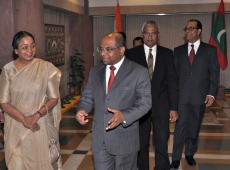The former chairman of the committee responsible for drafting the 2008 Constitution has said the country’s current crisis is the result of Maldivian citizens electing self-interested parliamentarians.
The Maldivian Democracy Network (MDN) released the 2012 Majlis (Parliament) Watch report on Sunday (March 24). The report was launched by Ibrahim ‘Ibra’ Ismail, former chairman of the Special Majlis Drafting Committee.
Ibra emphasised that parliamentarians must represent public welfare and national interests foremost and “not exploit their official positions,” as clause 75 of the Constitution specifies.
However he said most parliamentary decisions are influenced by individual, business, and political party interests.
Responsibility for MPs’ prioritising their self-interests above Maldivian citizens’ well-being should be placed with the Maldivian people who elected these “shadowy figures,” Ibra declared.
“I would say the current plight of this country is down to the failure of the 77 parliament members to take note of Article 75 of the constitution. When casting votes in parliament they are thinking what is the best thing for me? How can more political power be given to the person who secures business opportunities for me? How can an Article be written to make it easy for me? I’m not referring to a particular party but to everyone,” Haveeru quoted Ibra as saying.
“During the last parliamentary elections we’ve all heard people saying they would even vote for a cat if it was the candidate from a specific party. So we are seeing the result of that today. When cats are elected they will fight,” he added.
Parliament Watch 2012
MDN’s Executive Director, Humaida ‘Humey’ Abdulghafoor, emphasised that parliament’s main priority should be service to the people and discussed the report’s main findings.
“MDN is not privy to the same information as Ibra. We try to be very objective in what we say, do, and how we present the [Majlis Watch] report,” stated Abdulghafoor.
“We advocate Majlis members serve responsibly as representatives of the people. They should have a clear idea of the lives and livelihood needs of their constituents.
“MPs should monitor the main needs of their constituencies, ask important questions, and highlight issues that relate to the lives of their constituencies. Based on these needs, MPs should prioritise the most relevant legislation that reflects what the people would like to see,” Abdulghafoor added.
Some of the main issues highlighted in the MDN report are in regard to challenges parliament has faced following the controversial transfer of power last February.
“We acknowledge that 2012 was very difficult for the Majlis. Their work has been slowed due to pending issues, which are a reflection of the challenges faced over the last year,” said Abdulghafoor.
“In some months, such as March and August 2012, the number of [committee] meetings were far lower than anticipated. Also, parliament halted for several days in March, because quorum was not achieved,” she added.
Abdulghafoor also discussed how meaningful legislation is often delayed at the committee stage and takes a “number of years” to become law. She stated that MPs must work together to “accelerate and overcome” obstacles that impede the law-making process, so to meet the urgent needs of Maldivian citizens.
“The number of bills submitted was also significantly lower [than expected], because the government is the largest source of bills. After February 7 2012, the government was not able to submit legislation, because the executive (President Waheed Hassan Manik) didn’t have a representative in the Majlis,” she stated.
“In other words, there were no sitting Gaumee Iththihaadh Party (GIP) party members in parliament. To accommodate this challenge, parliament had to change their regulations, which didn’t occur until October,” Abdulghafoor further explained.
Free elections require civic education
MDN also highlighted parliamentarians’ responsibility to create civic awareness among their constituents and ensure elections are legitimate and free from corrupt practices.
“We are advocating for Maldivians to use their vote responsibly to ensure elections are inclusive, free and fair,” Abdulghafoor stated.
“Political parties have a huge responsibility to recruit members ‘cleanly’ as well as inform party members what civic participation entails and what [democratic] political processes are – openness and clarity.
“The recent reports of registered deceased people are a stain on the reputation of the political party,” she declared.
The Elections Commissions (EC) said it has noticed a surge of discrepancies on membership forms submitted by certain political parties including forged documents, forms with false information and even forms filed under the names of dead people.
Likes (0)Dislikes
(0)Dislikes (0)
(0) 